WMG News
WMG researchers at the University of Warwick part of new national £65 million battery research programme
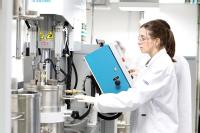 WMG researchers, at the University of Warwick, will be a significant part of a new £65 million national battery research initiative. The Faraday Institution, a new multi-million pound research institute, was announced on Monday 2nd October 2017, by Greg Clark, Secretary of State for Business, Energy and Industrial Strategy. It will drive and accelerate fundamental research in developing battery technologies, and its translation.
WMG researchers, at the University of Warwick, will be a significant part of a new £65 million national battery research initiative. The Faraday Institution, a new multi-million pound research institute, was announced on Monday 2nd October 2017, by Greg Clark, Secretary of State for Business, Energy and Industrial Strategy. It will drive and accelerate fundamental research in developing battery technologies, and its translation.
The Faraday Institution (FI) will be the UK’s independent, national institute for energy storage research. Funded through the Engineering and Physical Sciences Research Council (EPSRC) from the government’s Industrial Strategy Challenge Fund (ISCF), the Faraday Institution is part of the coordinated activity between UKRI partners Innovate UK and EPSRC with the Advanced Propulsion Centre (APC) to meet the Faraday Battery Challenge, announced by the government in July, of delivering an integrated programme of research, innovation and the scale-up of novel battery technologies.
The UK’s leading battery researchers in academia worked closely with UK industry to assess the challenges and opportunities, and the seven university founders (Cambridge, Imperial, Newcastle, Oxford, Southampton, UCL and Warwick) proposed to charter an independent national Institution as the best way forward. The ambition of the Faraday Institution is to make the UK the go-to place for the research, development, manufacture and production of new electrical storage technologies for both the automotive and the wider relevant sectors.
DELIVER-E: revolutionary electric delivery vehicle tech prototyped by WMG
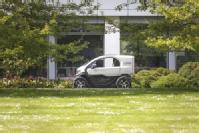 A technology demonstrator for a new type of electric delivery vehicle – which could make the courier industry greener and more efficient – has been developed by WMG at the University of Warwick and Warwickshire-based design company Astheimer Ltd.
A technology demonstrator for a new type of electric delivery vehicle – which could make the courier industry greener and more efficient – has been developed by WMG at the University of Warwick and Warwickshire-based design company Astheimer Ltd.
Based on the platform of a Renault Twizy, the DELIVER-E is a quiet, compact, lightweight electric vehicle, ideal for navigating urban environments, addressing issues like congestion, noise, pollution - and responding to the demands of an ever-growing shift to online shopping. This prototype allows cutting-edge WMG research outputs to be shown in a real, driveable vehicle.
A number of teams in WMG have worked on the project, including their SME Group who developed the original design, and with the help of one of their partners Astheimer, progressed the design from concept to prototype.
Astheimer developed the WMG concept to create a unique vehicle exterior - by enlarging its rear storage area, giving it space for three online delivery baskets. They also added new body panels to the DELIVER-E, and fitted it with programmable LED pixel strips, which can change colour for brake and indicator lights.
Response to the Faraday Challenge announcement
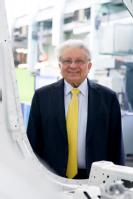 Professor Lord Bhattacharyya, Chairman, WMG, University of Warwick comments “I’m delighted to hear that the Government have announced plans to establish a centre for battery research in the UK. Not only will this support the Industrial Strategy, it will help change the perception of Britain from labs to manufacture.”
Professor Lord Bhattacharyya, Chairman, WMG, University of Warwick comments “I’m delighted to hear that the Government have announced plans to establish a centre for battery research in the UK. Not only will this support the Industrial Strategy, it will help change the perception of Britain from labs to manufacture.”
“Coventry and the sub region has a significant contribution to make in the delivery of the UK’s national industrial strategy, being in a strong position to lead the advancement of battery development, and vehicle electrification and autonomous vehicles. It will be at the heart of the drive to make the city a smart motor city.”
“Building on our automotive heritage, together with the Coventry and Warwickshire LEP, we are keen to develop and expand battery R&D, which will see the creation of these skilled jobs which will also be a trigger for other development by the private sector.
“Having a 37 year track record of working jointly with industry to innovate, and as leaders, for 15 years, in battery development, WMG are poised to continue to drive forward battery innovation and help create growth and employment in the UK.
The full announcement from the Business Secretary Greg Clarke MP can be heard here.
WMG partnership to improve automotive energy storage
 Assistant Professor John Low has been awarded an EPSRC First Grant to develop a more modern approach to design and manufacture automotive energy storage, targeting Lithium-ion battery and supercapacitor devices.
Assistant Professor John Low has been awarded an EPSRC First Grant to develop a more modern approach to design and manufacture automotive energy storage, targeting Lithium-ion battery and supercapacitor devices.
The project will focus on ‘a designer approach to structuring electrodes’ for improved energy storage performance so that low-carbon plug-in and electric vehicles can travel a longer distance per charge. The new electrodes are expected to gain a significant improvement in the final ‘usable’ energy density (Wh/kg) and ‘usable’ capacity (Ah) at device cell level.
The new and improved energy storage devices will be designed, manufactured and tested at our state-of-the-art battery prototyping WMG Energy Innovation Centre at the University of Warwick.
WMG and Jaguar Land Rover in electrifying £5.7 million Prosperity Partnership
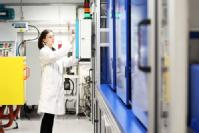 WMG at the University of Warwick has been awarded £5.7 million by the Engineering and Physical Sciences Research Council (EPSRC) to form a Prosperity Partnership with Jaguar Land Rover that could literally be described as ”electrifying”.
WMG at the University of Warwick has been awarded £5.7 million by the Engineering and Physical Sciences Research Council (EPSRC) to form a Prosperity Partnership with Jaguar Land Rover that could literally be described as ”electrifying”.
WMG’s Professor Barbara Shollock said:
“This Prosperity Partnership will tackle the emerging challenges for vehicle electrification through a unique collaboration to grow scientific understanding. This integrated approach brings the potential for the UK to lead, both industrially and scientifically, in an area of high growth and relevance in the UK's industrial strategy.”
“Our shared vision is to create new scientific insights to underpin the Automotive Council’s electrification agenda, from batteries and power electronics to electric motors and electric drive units.”
Electrification is a strategic target for the UK and a major element in the UK Industrial Strategy and an opportunity to grow a new globally-competitive industry. The UK strategy for ultra-low emission vehicles states the ‘vision is that by 2050 almost every car and van in the UK will be an ultra-low emission vehicle, with the UK at the forefront of their design, development and manufacture, making us one of the most attractive locations for ultra-low emission vehicle–related inward investment in the world’. To achieve this requires a step-change in knowledge, understanding and technology and Prosperity Partnership bringing together the WMG and Jaguar Land Rover will help achieve that.
Clean energy stored in electric vehicles to power buildings
Stored energy from electric vehicles (EVs) can be used to power large buildings – creating new possibilities for the future of smart, renewable energy - thanks to ground-breaking battery research from WMG at the University of Warwick.
 Dr Kotub Uddin, with colleagues from WMG’s Energy and Electrical Systems group and Jaguar Land Rover, has demonstrated that vehicle-to-grid (V2G) technology can be intelligently utilised to take enough energy from idle EV batteries to be pumped into the grid and power buildings – without damaging the batteries.
Dr Kotub Uddin, with colleagues from WMG’s Energy and Electrical Systems group and Jaguar Land Rover, has demonstrated that vehicle-to-grid (V2G) technology can be intelligently utilised to take enough energy from idle EV batteries to be pumped into the grid and power buildings – without damaging the batteries.
This new research into the potentials of V2G show that it could actually improve vehicle battery life by around ten percent over a year.
Revolutionary method reveals impact of short circuits on battery safety
 How lithium-ion (Li-ion) batteries behave under short-circuit conditions can now be examined, using a new approach to help improve reliability and safety - developed by an international research team, including WMG at the University of Warwick.
How lithium-ion (Li-ion) batteries behave under short-circuit conditions can now be examined, using a new approach to help improve reliability and safety - developed by an international research team, including WMG at the University of Warwick.
The use of high energy density Li-ion batteries is ubiquitous – from powering portable electronics to providing grid-scale storage – but defects can lead to overheating and explosions.
Although catastrophic failure is extremely rare, recent high-profile cases including the recall of Samsung’s Galaxy Note 7 smartphone line and the grounding of an aircraft fleet highlight why it’s important to understand battery failure.
Romeo Malik, a researcher at WMG, explained the experiment:
“As the safety and reliability of batteries is paramount, it is important to know and understand the extreme scenarios of battery failure.
“In this work, we were able to see the initiation of thermal runway and how quickly it escalated to the neighbouring cells in seconds. Being able to observe and capture these rapid failures with high-speed X-ray imaging technique is amazing.”
PhD researcher sought to help test huge car electrical system that will stretch from Newcastle to London
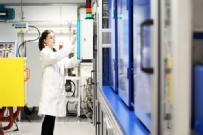 Car battery researchers at WMG at the University of Warwick have just bought specialist “Hardware-in-the-Loop” high power computing equipment. This will connect real time high tech battery research testing at the University of Warwick with simultaneous tests on real advanced hybrid electric vehicle components at five other universities. Now WMG are looking to recruit a PhD research student to run the battery test while connecting it to an England wide simultaneous test of a vehicle’s electrical systems.
Car battery researchers at WMG at the University of Warwick have just bought specialist “Hardware-in-the-Loop” high power computing equipment. This will connect real time high tech battery research testing at the University of Warwick with simultaneous tests on real advanced hybrid electric vehicle components at five other universities. Now WMG are looking to recruit a PhD research student to run the battery test while connecting it to an England wide simultaneous test of a vehicle’s electrical systems.
£2.2m award by the Department of Transport for ZAPINAMO and WMG to trial new technology for charging electric commercial vehicles
Transport Minister John Hayes has announced that ZAPINAMO has been awarded £2.2m by the Department of Transport, the Office for Low Emission Vehicles and Innovate UK under the Low Emissions Freight Trial to work with WMG and others to trial technology for ultra high speed rapid and movable charging technology for commercial vehicles.
ZAPINAMO's technology uses on/off grid and renewable sources for EV charging and is capable of delivering over 400kW to charge a vehicle in minutes. This represents a step change in how we charge EVs as it is the first charging technology which can meet the demands of electric commercial vehicles with long and demanding duty cycles.
